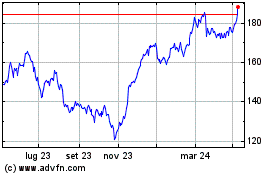Challenge for CEOs: When Does It Make Sense to Speak Out?
10 Dicembre 2019 - 6:09PM
Dow Jones News
By Chip Cutter
Before the chief executive of the industrial conglomerate
Siemens AG spoke out on the rise of a nationalist anti-immigration
party in Germany, he reached out to employees on the company's
internal social network.
"What do you think?" the CEO, Joe Kaeser, asked workers. "Should
I get engaged in social matters?"
The response was clear: Nearly 89% of employees surveyed voted
in favor of Mr. Kaeser sharing his views on political matters, he
said Tuesday, a response that highlights the changing nature of the
job of a top executive. Siemens employs about 385,000 people
globally.
Corporate leaders today must increasingly walk a fine line,
serving shareholders while also speaking out on potentially fraught
political issues ranging from immigration to gun control, said Amy
Borrus, incoming director of the Council of Institutional
Investors, which represents large investors. Many employees and
customers now look to corporate leaders for their views, she said,
though sharing can be perilous.
"Every time you speak out," Ms. Borrus said in a morning session
of The Wall Street Journal's CEO Council meeting, "you risk getting
slammed because some of your customers, some of your employees,
disagree."
Mr. Kaeser has been outspoken on a range of issues in the U.S.
and abroad. He has criticized U.S. immigration policies and taken
on President Trump, saying earlier this year he was concerned that
the "most powerful office in the world is being associated with
racism."
After the anti-immigration Alternative for Deutschland party, or
AfD, won support in a 2017 German election, Mr. Kaeser talked about
the complacency of German's elites and made comparisons to the rise
of Hitler's Nazi party in the 1930s. Mr. Kaeser said Tuesday he saw
a duty to speak out, and said executives must explain their
business decisions to employees.
Many executives say they increasingly must serve a range of
stakeholders beyond investors. Earlier this year, the Business
Roundtable changed its statement on the purpose of the corporation,
noting that companies should look beyond shareholders to also
consider their impact of their decisions on employees, customers
and the community.
Speaking in the audience at the Journal's CEO Council event, the
advertising executive Sir Martin Sorrell, executive chairman of S4
Capital, said the Business Roundtable statement struck him as in
parts "greenwashing," and said that if companies invest in the
long-term, they will naturally consider all stakeholders and
"everything fits neatly into place."
Still, choosing how to speak out isn't always clear. Ms. Borrus
said executives must pick their issues, reflecting on those that
are relevant to the company, and said private companies have more
leeway.
As corporate leaders go public with their views, employees also
are becoming more active, pushing back against business decisions.
Employees at companies such as Alphabet's Google have walked out on
the job in recent years, and workers at Google and other tech
organizations have protested Defense Dept. contracts and other
business.
Ms. Borrus questioned whether the rise of activism inside
American corporations would continue in a different economic
climate. "We'll see what happens come the recession when jobs
aren't as secure," she said. "Will there still be this same
employee push?"
(END) Dow Jones Newswires
December 10, 2019 11:54 ET (16:54 GMT)
Copyright (c) 2019 Dow Jones & Company, Inc.
Grafico Azioni Siemens (TG:SIE)
Storico
Da Mar 2024 a Apr 2024

Grafico Azioni Siemens (TG:SIE)
Storico
Da Apr 2023 a Apr 2024
